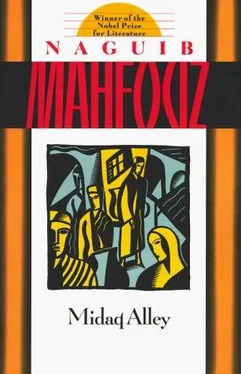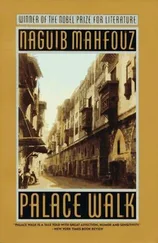Naguib Mahfouz - Midaq Alley
Здесь есть возможность читать онлайн «Naguib Mahfouz - Midaq Alley» весь текст электронной книги совершенно бесплатно (целиком полную версию без сокращений). В некоторых случаях можно слушать аудио, скачать через торрент в формате fb2 и присутствует краткое содержание. Жанр: Современная проза, на английском языке. Описание произведения, (предисловие) а так же отзывы посетителей доступны на портале библиотеки ЛибКат.
- Название:Midaq Alley
- Автор:
- Жанр:
- Год:неизвестен
- ISBN:нет данных
- Рейтинг книги:4 / 5. Голосов: 1
-
Избранное:Добавить в избранное
- Отзывы:
-
Ваша оценка:
- 80
- 1
- 2
- 3
- 4
- 5
Midaq Alley: краткое содержание, описание и аннотация
Предлагаем к чтению аннотацию, описание, краткое содержание или предисловие (зависит от того, что написал сам автор книги «Midaq Alley»). Если вы не нашли необходимую информацию о книге — напишите в комментариях, мы постараемся отыскать её.
Midaq Alley — читать онлайн бесплатно полную книгу (весь текст) целиком
Ниже представлен текст книги, разбитый по страницам. Система сохранения места последней прочитанной страницы, позволяет с удобством читать онлайн бесплатно книгу «Midaq Alley», без необходимости каждый раз заново искать на чём Вы остановились. Поставьте закладку, и сможете в любой момент перейти на страницу, на которой закончили чтение.
Интервал:
Закладка:
Sanker brought the coffee for the poet, as the "doctor" requested. The old man raised the cup to his lips, blowing into it to cool the drink. He then sipped it and continued to do so until it was finished. He placed the cup to one side and only then recalled the ill-mannered behavior of the waiter toward him. Gazing at the youth with apparent disdain, he muttered indignantly, "Ill-mannered fellow…"
He picked up his instrument and began to pluck its strings, avoiding the angry looks Sanker gave him. He played a few introductory notes just as the cafe had heard him play every evening for twenty years or more. His frail body swayed in time with the music. Then he cleared his throat, spat, and said, "In the name of God." Crying out in his harsh-sounding voice, he continued: "We are going to begin today by saying a prayer for the Prophet. An Arab Prophet, the chosen son of the people of Adnan. Abu Saada, the Zanaty, says that…"
He was interrupted by someone who entered at that point and said roughly, "Shut up! Don't say a single word more!"
The old man lifted his failing eyes from his instrument and saw the sleepy, gloomy eyes of Kirsha, the tall, thin, dark-faced cafe owner, looking down at him. He stared at him glumly and hesitated a moment as though unable to believe his ears. Trying to ignore Kirsha's unpleasantness, he began reciting again, "Abu Saada, the Zanaty, says that…"
The cafe owner shouted in angry exasperation, "Are you going to force your recitations on us? That's the end — the end! Didn't I warn you last week?"
A look of disappointment came into the poet's face and he commented critically, "I can see you have been living fast lately. Can't you take it out on someone else?"
Even more exasperated, Kirsha shouted again, "I know what I said and what I want, you imbecile. Do you think I am going to allow you to perform in my cafe if you are going to slander me with your vile tongue?"
The old poet sweetened his tone a little as he tried to soothe the angry man and said, "This is my cafe too. Haven't I been reciting here for the last twenty years?"
The cafe owner took his usual seat behind the till and replied, "We know all the stories you tell by heart and we don't need to run through them again. People today don't want a poet. They keep asking me for a radio and there's one over there being installed now. So go away and leave us alone and may God provide for you…"
The old man's face clouded and he remembered sadly that Kirsha's cafe was the only one left to him and, indeed, his last source of livelihood and one which had served him well. Only the day before, the Castle cafe had sent him away. Old as he was, and now with his living cut off, what was he to do with his life? What was the point of teaching his poor son this profession when it had died like this? What could the future hold for him and how could he provide for his son? A feeling of despair seized him and increased in intensity when he saw the look of regretful determination on Kirsha's face. The old man pleaded, "Slowly, slowly, Mr. Kirsha. Public reciters still have an appeal which won't disappear. The radio will never replace us."
Firmly and decisively, however, the cafe owner replied, "That is what you say, but it is not what my customers say and you are not going to ruin my business. Everything has changed!"
In despair, the old man insisted, "Haven't people listened to these stories without being bored since the days of the Prophet, peace be upon him?"
Kirsha brought his hand down hard on the till and shouted, "I said everything has changed!"
At this the absentminded and statuesque man wearing the gold-rimmed spectacles and the necktie moved for the first time. He turned his gaze to the cafe's roof and sighed so deeply that his friends almost expected pieces of flesh to come up with the passage of air. In a dreamy tone, he said, "Yes, everything has changed. Yes, indeed, everything has changed, my lady. Everything has changed except my heart and it still loves the people of the house of Amir."
He lowered his head slowly, moving it to the left and to the right as he did so, with movements gradually decreasing in extent until he at last returned to his previous immobile position. Once again he sank into oblivion. None of those present, accustomed as they were to his peculiarities, had so much as turned toward him, with the exception of the old reciter who looked at him and said appealingly, "Sheikh Darwish, does this please you?"
The other man remained, however, as though lost to the world and said nothing. Just then another person arrived who was greeted with looks of admiration and affection, and they all responded enthusiastically to his greeting.
Radwan Hussainy was a man of impressive appearance, both broad and tall, a flowing black cloak covering his ample form, his face large and whitish with tinges of red. He wore a reddish-colored beard. His forehead seemed to shine with light and its surface gleamed with happiness, tolerance, and deep faith. He walked slowly, with his head slightly bent, and a smile on his lips announced his love for both people and life.
He chose a seat next to the poet's sofa and, as soon as he did so, the old man began to complain to him. Radwan Hussainy listened good-naturedly, although he knew well what the trouble was. Indeed, on a number of occasions he had tried to dissuade the cafe owner, Kirsha, from his intention to dispense with the reciter but he had always been unsuccessful. When the old man finished his complaint, Hussainy did what he could to console him and promised to help him find a job for the poet's son. He then generously placed some coins in his hand and whispered in his ear, "We are all sons of Adam. If poverty descends on you then seek help from your brother. Man's provider is God and it is to God that any excess is due."
As he said this, his fine face was filled with even greater radiance, just as all noble men, doing the good they love, become happier and more handsome through their actions. He had always taken care that not a single day should pass without doing some good deed or receiving in his home some abused or unfortunate person. From his love of goodness and his generosity he appeared to be richly endowed with wealth and property, but the fact was that he owned nothing except the house on the right hand side of Midaq Alley and a few acres of land in Marj. The people who lived in his house — Kirsha on the third floor, and Uncle Kamil and Abbas, the barber, on the first — had found him a kind and fair landlord. He had ignored the rights the special military edict had given him to raise the rent of first-floor tenants, out of compassion for the occupants of modest means. He was, in fact, in all his actions wherever he went, a man of compassion and sympathy.
His life, especially in its earlier stages, had been filled with disappointment and pain. The period he had spent studying at the University of al-Azhar had ended in failure. He had spent a considerable portion of his life within its cloisters and yet had not succeeded in obtaining a degree. Besides, he had been afflicted with the loss of his children and now none remained, although he had had several. He had tasted the bitterness of disappointment so much that his heart almost overflowed with a despair that nearly choked him…
His faith rescued him from the gloom of his sorrows to the light of love, and his heart now no longer held grief or anxiety. He was filled with an all-embracing love, goodness, and wonderful patience. He stepped lightly over the sorrows of the world, his heart soaring heavenward as he embraced everyone with his love.
As time brought him added tragedies, so had he increased in his patience and love. One day people saw him laying one of his sons in his last resting place while he recited the Qur'an, his face filled with happiness. They gathered around him comforting and consoling him, but he had only smiled and, pointing to the sky, said, "He gave and He has taken back; all things are at His command and all things belong to Him. It would be blasphemous to sorrow."
Читать дальшеИнтервал:
Закладка:
Похожие книги на «Midaq Alley»
Представляем Вашему вниманию похожие книги на «Midaq Alley» списком для выбора. Мы отобрали схожую по названию и смыслу литературу в надежде предоставить читателям больше вариантов отыскать новые, интересные, ещё непрочитанные произведения.
Обсуждение, отзывы о книге «Midaq Alley» и просто собственные мнения читателей. Оставьте ваши комментарии, напишите, что Вы думаете о произведении, его смысле или главных героях. Укажите что конкретно понравилось, а что нет, и почему Вы так считаете.












